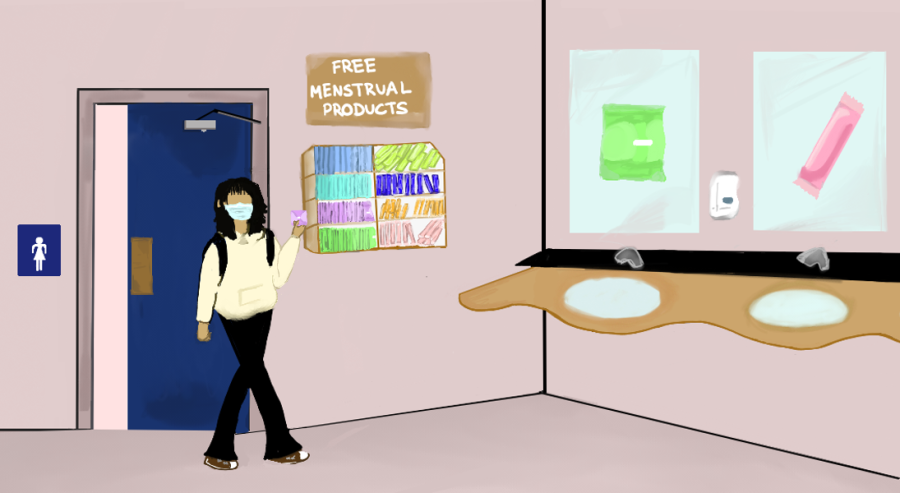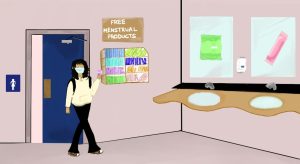A pivotal demand
Menstrual products in restrooms must be available to students, free of cost
More stories from Destiny Avila Ramirez
Students are able to use menstrual products once they are made available in girls’ restrooms. This creates a comfortable environment for those who need it.
Toilet paper, hand soap, sinks and hand dryers are all found available in the public restrooms at Bonita Vista High (BVH). Though, there is not everything necessary to provide students with the most support possible. Basic necessities and menstrual products are not included in student restrooms and are not made available to the students of BVH. However, menstrual products must be made available in school restrooms, free of cost. The lack of access to menstrual hygiene products could negatively affect students’ social and educational well-being. Unfortunately, this issue has not escaped the minds of many young women who must view the issue on school campuses.
According to a study from State of the Period 2021 tracking the impact of period poverty among the United States (US) teenage students funded by the feminine hygiene company of PERIOD and Thinx, “Lack of access to period products for students remains a significant issue [with] 23% of students have struggled to afford period products.”
Period poverty—a term referring to a lack of access to menstrual products, sanitation facilities and adequate education—is a prevalent issue in today’s society that needs solutions to be taken. The actions must start with bringing knowledge to a variety of individuals. Attention must be brought to this topic of discussion in places like BVH. Many individuals may find themselves unaware of the period poverty issue in the US.
“Often viewed as an issue faced primarily by individuals in developing countries, many are shocked to learn that nearly one in five American girls have either left school early or missed school entirely due to a lack of access to menstrual products,” a Womensenews article by Shruti Sathish stated.
There is no support for women going through menstruation shown at schools and the idea of menstruation being openly brought into society for students is shut down. A study conducted by Always revealed that, “over 1 in 3 young people feel less confident because they’ve missed after school activities. 1 nearly 1 out of 3 parents are worried about their ongoing ability to afford period products—an issue known as period poverty.” Missing school may lead to missed opportunities and a drop in confidence causing girls to feel self-conscious or uncomfortable.
Based on an article titled “Why Schools Should Provide Free Menstrual Products” written by Kate Maxwell, “Without access to supplies, students often miss class or do not participate as vigorously for fear of leakage and embarrassment. Fear of period leakage prevents students from being able to focus in class and that can overall impact educational outcomes.”
Without the needed support provided by administrators in their restrooms, menstruation is then surrounded by a stigma. This stigma promotes the notion that the issue should not be talked about in public settings, including school campuses. Because of this, young girls are encouraged to take care of their menstrual-related problems on their own, receiving little to no guidance.
“Pads and tampons are really as essential as pencils and test papers as school supplies and really shouldn’t be treated any differently than toilet paper and hand soap in bathrooms,” executive director of Minnesota’s National Council of Jewish Women Beth Gendler said in her article titled “Students lead push for free menstrual products in Minnesota school”.
In addition, if BVH were to provide free products of sanitary pads, tampons and many more in student restrooms, the school’s administrators would have to take into account the yearly cost. According to press reports, the Yonkers Board of Education estimated that supplies would cost 29 dollars per student per year if schools were to supply free pads and tampons in student restrooms. Ultimately, the costs of products should not be considered a ‘barrier’ nor a potential excuse for providing free menstrual products to students. When schools are willing to provide toilet paper free of cost all throughout the school year, the case for menstrual products should be no different.
“It’s time for everyone to realize that menstrual products are necessities, not luxuries, and that periods should be embraced, not feared,” Sathish said.




